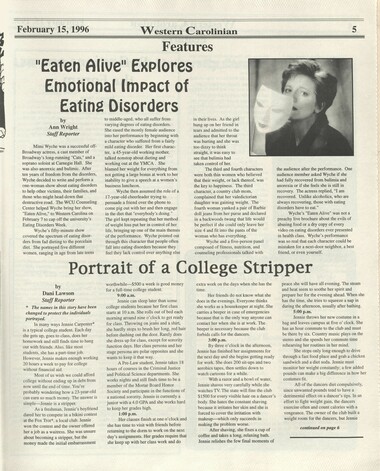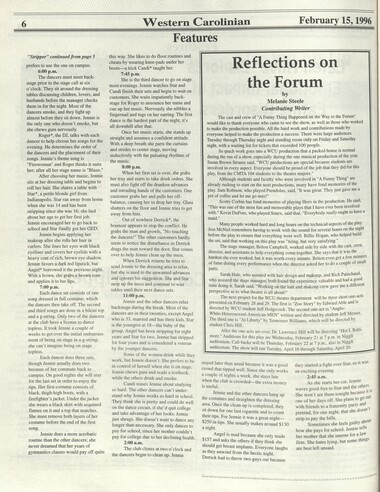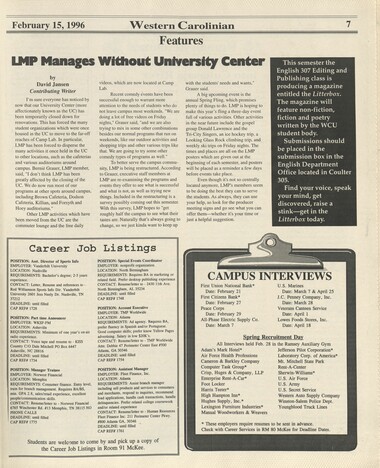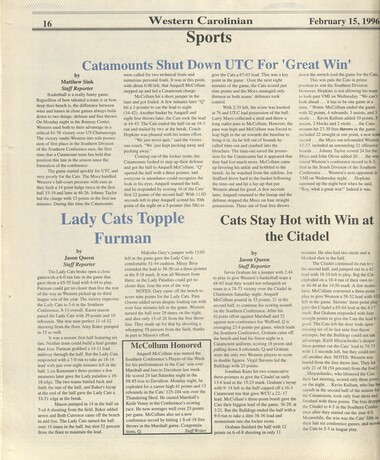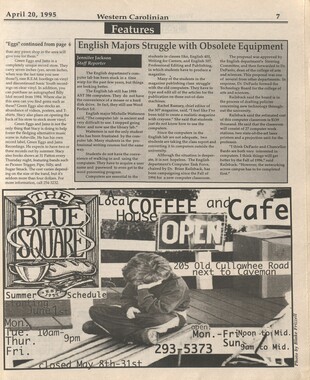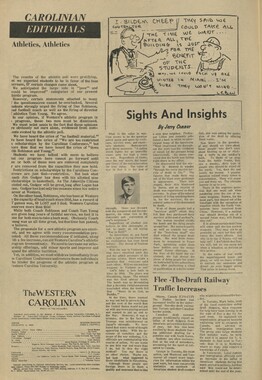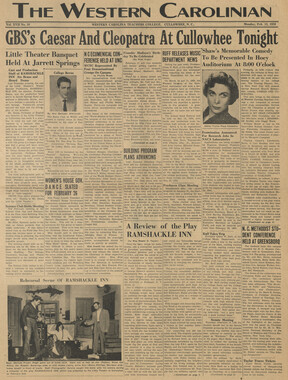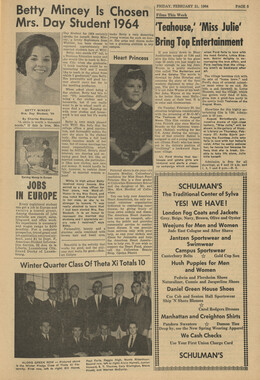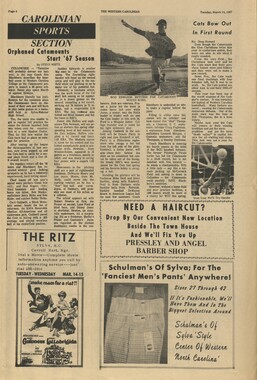Western Carolina University (20)
View all
- Canton Champion Fibre Company (2308)
- Cherokee Traditions (293)
- Civil War in Southern Appalachia (165)
- Craft Revival (1942)
- Great Smoky Mountains - A Park for America (2767)
- Highlights from Western Carolina University (430)
- Horace Kephart (941)
- Journeys Through Jackson (154)
- LGBTQIA+ Archive of Jackson County (26)
- Oral Histories of Western North Carolina (314)
- Picturing Appalachia (6772)
- Stories of Mountain Folk (413)
- Travel Western North Carolina (160)
- Western Carolina University Fine Art Museum Vitreograph Collection (129)
- Western Carolina University Herbarium (92)
- Western Carolina University: Making Memories (708)
- Western Carolina University Publications (2283)
- Western Carolina University Restricted Electronic Theses and Dissertations (146)
- Western North Carolina Regional Maps (71)
- World War II in Southern Appalachia (131)
University of North Carolina Asheville (6)
View all
- Allanstand Cottage Industries (62)
- Appalachian National Park Association (53)
- Bennett, Kelly, 1890-1974 (1388)
- Berry, Walter (76)
- Brasstown Carvers (40)
- Carver, George Washington, 1864?-1943 (26)
- Cathey, Joseph, 1803-1874 (1)
- Champion Fibre Company (233)
- Champion Paper and Fibre Company (297)
- Cherokee Indian Fair Association (16)
- Cherokee Language Program (22)
- Crowe, Amanda (40)
- Edmonston, Thomas Benton, 1842-1907 (7)
- Ensley, A. L. (Abraham Lincoln), 1865-1948 (275)
- Fromer, Irving Rhodes, 1913-1994 (70)
- George Butz (BFS 1907) (46)
- Goodrich, Frances Louisa (120)
- Grant, George Alexander, 1891-1964 (96)
- Heard, Marian Gladys (60)
- Kephart, Calvin, 1883-1969 (15)
- Kephart, Horace, 1862-1931 (313)
- Kephart, Laura, 1862-1954 (39)
- Laney, Gideon Thomas, 1889-1976 (439)
- Masa, George, 1881-1933 (61)
- McElhinney, William Julian, 1896-1953 (44)
- Niggli, Josephina, 1910-1983 (10)
- North Carolina Park Commission (105)
- Osborne, Kezia Stradley (9)
- Owens, Samuel Robert, 1918-1995 (11)
- Penland Weavers and Potters (36)
- Roberts, Vivienne (15)
- Roth, Albert, 1890-1974 (142)
- Schenck, Carl Alwin, 1868-1955 (1)
- Sherrill's Photography Studio (2565)
- Southern Highland Handicraft Guild (127)
- Southern Highlanders, Inc. (71)
- Stalcup, Jesse Bryson (46)
- Stearns, I. K. (213)
- Thompson, James Edward, 1880-1976 (226)
- United States. Indian Arts and Crafts Board (130)
- USFS (683)
- Vance, Zebulon Baird, 1830-1894 (1)
- Weaver, Zebulon, 1872-1948 (58)
- Western Carolina College (230)
- Western Carolina Teachers College (282)
- Western Carolina University (1794)
- Western Carolina University. Mountain Heritage Center (18)
- Whitman, Walt, 1819-1892 (10)
- Wilburn, Hiram Coleman, 1880-1967 (73)
- Williams, Isadora (3)
- Cain, Doreyl Ammons (0)
- Crittenden, Lorraine (0)
- Rhodes, Judy (0)
- Smith, Edward Clark (0)
- Appalachian Region, Southern (2399)
- Asheville (N.C.) (1917)
- Avery County (N.C.) (26)
- Blount County (Tenn.) (161)
- Buncombe County (N.C.) (1671)
- Cherokee County (N.C.) (283)
- Clay County (N.C.) (555)
- Graham County (N.C.) (233)
- Great Smoky Mountains National Park (N.C. and Tenn.) (510)
- Haywood County (N.C.) (3522)
- Henderson County (N.C.) (70)
- Jackson County (N.C.) (4692)
- Knox County (Tenn.) (25)
- Knoxville (Tenn.) (12)
- Lake Santeetlah (N.C.) (10)
- Macon County (N.C.) (420)
- Madison County (N.C.) (211)
- McDowell County (N.C.) (39)
- Mitchell County (N.C.) (132)
- Polk County (N.C.) (35)
- Qualla Boundary (981)
- Rutherford County (N.C.) (76)
- Swain County (N.C.) (2113)
- Transylvania County (N.C.) (247)
- Watauga County (N.C.) (12)
- Waynesville (N.C.) (73)
- Yancey County (N.C.) (72)
- Aerial Photographs (3)
- Aerial Views (60)
- Albums (books) (4)
- Articles (1)
- Artifacts (object Genre) (228)
- Bibliographies (1)
- Biography (general Genre) (2)
- Cards (information Artifacts) (38)
- Clippings (information Artifacts) (191)
- Crafts (art Genres) (622)
- Depictions (visual Works) (21)
- Design Drawings (1)
- Drawings (visual Works) (184)
- Envelopes (73)
- Facsimiles (reproductions) (1)
- Fiction (general Genre) (4)
- Financial Records (12)
- Fliers (printed Matter) (67)
- Glass Plate Negatives (381)
- Guidebooks (2)
- Internegatives (10)
- Interviews (812)
- Land Surveys (102)
- Letters (correspondence) (1013)
- Manuscripts (documents) (619)
- Maps (documents) (177)
- Memorandums (25)
- Minutes (administrative Records) (59)
- Negatives (photographs) (5835)
- Newsletters (1285)
- Newspapers (2)
- Occupation Currency (1)
- Paintings (visual Works) (1)
- Pen And Ink Drawings (1)
- Periodicals (193)
- Personal Narratives (10)
- Photographs (12976)
- Plans (maps) (1)
- Poetry (7)
- Portraits (1960)
- Postcards (329)
- Programs (documents) (151)
- Publications (documents) (2237)
- Questionnaires (65)
- Scrapbooks (282)
- Sheet Music (2)
- Slides (photographs) (402)
- Songs (musical Compositions) (2)
- Sound Recordings (796)
- Specimens (92)
- Speeches (documents) (15)
- Tintypes (photographs) (8)
- Transcripts (322)
- Video Recordings (physical Artifacts) (23)
- Vitreographs (129)
- Text Messages (0)
- A.L. Ensley Collection (275)
- Appalachian Industrial School Records (7)
- Appalachian National Park Association Records (336)
- Axley-Meroney Collection (2)
- Bayard Wootten Photograph Collection (20)
- Bethel Rural Community Organization Collection (7)
- Blumer Collection (5)
- C.W. Slagle Collection (20)
- Canton Area Historical Museum (2110)
- Carlos C. Campbell Collection (282)
- Cataloochee History Project (65)
- Cherokee Studies Collection (4)
- Daisy Dame Photograph Album (5)
- Daniel Boone VI Collection (1)
- Doris Ulmann Photograph Collection (112)
- Elizabeth H. Lasley Collection (1)
- Elizabeth Woolworth Szold Fleharty Collection (4)
- Frank Fry Collection (95)
- George Masa Collection (173)
- Gideon Laney Collection (452)
- Hazel Scarborough Collection (2)
- Hiram C. Wilburn Papers (28)
- Historic Photographs Collection (236)
- Horace Kephart Collection (861)
- Humbard Collection (33)
- Hunter and Weaver Families Collection (1)
- I. D. Blumenthal Collection (4)
- Isadora Williams Collection (4)
- Jesse Bryson Stalcup Collection (47)
- Jim Thompson Collection (224)
- John B. Battle Collection (7)
- John C. Campbell Folk School Records (80)
- John Parris Collection (6)
- Judaculla Rock project (2)
- Kelly Bennett Collection (1407)
- Love Family Papers (11)
- Major Wiley Parris Civil War Letters (3)
- Map Collection (12)
- McFee-Misemer Civil War Letters (34)
- Mountain Heritage Center Collection (4)
- Norburn - Robertson - Thomson Families Collection (44)
- Pauline Hood Collection (7)
- Pre-Guild Collection (2)
- Qualla Arts and Crafts Mutual Collection (12)
- R.A. Romanes Collection (681)
- Rosser H. Taylor Collection (1)
- Samuel Robert Owens Collection (94)
- Sara Madison Collection (144)
- Sherrill Studio Photo Collection (2558)
- Smoky Mountains Hiking Club Collection (616)
- Stories of Mountain Folk - Radio Programs (374)
- The Reporter, Western Carolina University (510)
- Venoy and Elizabeth Reed Collection (16)
- WCU Gender and Sexuality Oral History Project (32)
- WCU Mountain Heritage Center Oral Histories (25)
- WCU Oral History Collection - Mountain People, Mountain Lives (71)
- WCU Students Newspapers Collection (1744)
- Western North Carolina Tomorrow Black Oral History Project (69)
- William Williams Stringfield Collection (2)
- Zebulon Weaver Collection (109)
- African Americans (390)
- Appalachian Trail (35)
- Artisans (521)
- Cherokee art (84)
- Cherokee artists -- North Carolina (10)
- Cherokee language (21)
- Cherokee pottery (101)
- Cherokee women (208)
- Church buildings (167)
- Civilian Conservation Corps (U.S.) (110)
- College student newspapers and periodicals (1830)
- Dams (103)
- Dance (1023)
- Education (222)
- Floods (61)
- Folk music (1015)
- Forced removal, 1813-1903 (2)
- Forest conservation (220)
- Forests and forestry (1058)
- Gender nonconformity (4)
- Great Smoky Mountains National Park (N.C. and Tenn.) (181)
- Hunting (38)
- Landscape photography (10)
- Logging (103)
- Maps (84)
- Mines and mineral resources (8)
- North Carolina -- Maps (18)
- Paper industry (38)
- Postcards (255)
- Pottery (135)
- Railroad trains (71)
- Rural electrification -- North Carolina, Western (3)
- School integration -- Southern States (2)
- Segregation -- North Carolina, Western (5)
- Slavery (5)
- Sports (452)
- Storytelling (245)
- Waterfalls -- Great Smoky Mountains (N.C. and Tenn.) (66)
- Weaving -- Appalachian Region, Southern (280)
- Wood-carving -- Appalachian Region, Southern (328)
- World War, 1939-1945 (173)
Western Carolinian Volume 61 Number 16
Item
Item’s are ‘child’ level descriptions to ‘parent’ objects, (e.g. one page of a whole book).
-
-
February 15,1996 AVestern Carolinian Features "Eaten Alive" Explores Emotional Impact of Eating Disorders by Ann Wright Staff Reporter Mimi Wyche was a successful off- Broadway actress, a cast member of Broadway's long-running "Cats," and a soprano soloist at Carnegie Hall. She was also anorexic and bulimic. After ten years of freedom from the disorders, Wyche decided to write and perform a one-woman show about eating disorders to help other victims, their families, and those who might head down that destructive road. The WCU Counseling Center helped Wyche bring her show, "Eaten Alive," to Western Carolina on February 7 to cap off the university's Eating Disorders Week. Wyche's fifty-minute show covered the spectrum of eating disorders from fad dieting to the porcelain diet. She portrayed five different women, ranging in age from late teens to middle-aged, who all suffer from varying degrees of eating disorders. She eased the mostly female audience into her performance by beginning with a character who suffered from a fairly mild eating disorder. Her first character, a 45-year-old working mother, talked nonstop about dieting and working out at the YMCA . She blamed her weight for everything from not getting a large bonus at work to her inability to give a speech at a women's business luncheon. Wyche then assumed the role of a 17-year-old cheerleader trying to persuade a friend over the phone to come pig out with her and then engage in the diet that "everybody's doing." The girl kept repeating that her method of weight loss put her in control of her life, bringing up one of the main themes of the performance. Wyche pointed out through this character that people often fall into eating disorders because they feel they lack control over anything else in their lives. As the girl hung up on her friend in tears and admitted to the audience that her throat was hurting and she was too dizzy to think straight, it was easy to see that bulimia had taken control of her. The third and fourth characters were both thin women who believed that their weight, or lack thereof, was the key to happiness. The third character, a country club mom, complained that her valedictorian daughter was gaining weight. The fourth woman yanked a pair of Barbie doll jeans from her purse and declared in a backwoods twang that life would be perfect if she could only leave her size 4 and fit into the pants of the woman who has everything. Wyche and a five-person panel composed of fitness, nutrition, and counseling professionals talked with the audience after the performance. One audience member asked Wyche if she had fully recovered from bulimia and anorexia or if she feels she is still in recovery. The actress replied, "I am recovered. Unlike alcoholics, who are always recovering, those with eating disorders have to eat." Wyche's "Eaten Alive" was not a preachy live brochure about the evils of abusing food or a dry copy of every video on eating disorders ever presented in health class. Wyche's performance was so real that each character could be mistaken for a next-door neighbor, a best friend, or even yourself. Portrait of a College Stripper by Dani Lawson Staff Reporter * The names in this story have been changed to protect the individuals portrayed. In many ways Jennie Carpenter* is a typical college student. Each day she gets up, goes to class, does her homework and still finds time to hang out with friends. Also, like most students, she has a part-time job. However, Jennie makes enough working 20 hours a week to pay for college without financial aid. Most of us wish we could afford college without ending up in debt from now until the end of time. You're probably wondering how a 23-year-old can earn so much money. The answer is simple—Jennie is a stripper. As a freshman, Jennie's boyfriend dared her to compete in a bikini contest at the Fox Trot*, a local club. Jennie won the contest and the owner offered her a job as a waitress. She was unsure about becoming a stripper, but the money made the initial embarrassment worthwhile—$500 a week is good money for a full-time college student. 9:00 a.m. Jennie can sleep later than some college students because her first class starts at 10 a.m. She rolls out of bed each morning around nine o'clock to get ready for class. Throwing on jeans and a shirt, she hardly stops to brush her long, red hair before dashing out the door. Rarely does she dress up for class, except for sorority function days. Her class persona and her stage persona are polar opposites and she wants to keep it that way. A Pre-Law student, Jennie takes 18 hours of courses in the Criminal Justice and Political Science departments. She works nights and still finds time to be a member of the Mortar Board Honor Society and participate in the functions of a national sorority. Jennie is currently a junior with a 4.0 GPA and she works hard to keep her grades high. 1:00 p.m. Her classes finish at one o'clock and she has time to visit with friends before returning to the dorm to work on the next day's assignments. Her grades require that she keep up with her class work and do extra work on the days when she has the time. Her friends do not know what she does in the evenings. Everyone thinks she works as a housekeeper at night. She carries a beeper in case of emergencies because that is the only way anyone can contact her when she is at work. The beeper is necessary because the club forbids calls for the dancers. 3:00 p.m. By three o'clock in the afternoon, Jennie has finished her assignments for the next day and she begins getting ready for work. She does 200 sit-ups and two aerobics tapes, then settles down to watch cartoons for a while. With a razor and a bowl of water, Jennie shaves very carefully while she watches TV. The state will fine the club $1500 for every visible hair on a dancer's body. She hates the constant shaving because it irritates her skin and she is forced to cover the irritation with makeup—which only succeeds in making the problem worse. After shaving, she fixes a cup of coffee and takes a long, relaxing bath. Jennie relishes the few final moments of peace she will have all evening. The steam and heat seem to soothe her spirit and prepare her for the evening ahead. When she has the time, she tries to squeeze a nap in during the afternoon, usually after bathing. 5:00 p.m. Jennie throws her new costume in a bag and leaves campus at five o' clock. She has an hour commute to the club and must be there by six. Country music plays on the stereo and she spends her commute time rehearsing her routines in her mind. She stops only long enough to drive through a fast food place and grab a chicken sandwich and a diet soda. Jennie must monitor her weight constantly; a few added pounds can make a big difference in how her costumes fit. All of the dancers diet compulsively, since unwanted pounds tend to have a detrimental effect on a dancer's tips. In an effort to fight weight gain, the dancers exercise often and count calories with a vengeance. The owner of the club built a weight room for the dancers, but Jennie continued on page 6
Object
Object’s are ‘parent’ level descriptions to ‘children’ items, (e.g. a book with pages).
-
The Western Carolinian is Western Carolina University's student-run newspaper. The paper was published as the Cullowhee Yodel from 1924 to 1931 before changing its name to The Western Carolinian in 1933.
-
